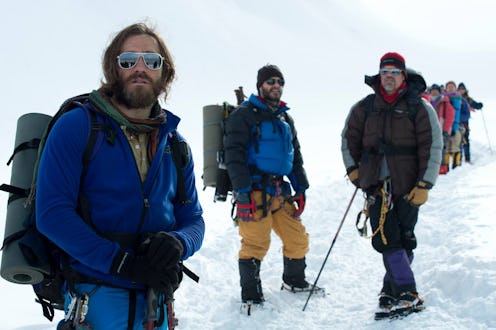
Hollywood stars Jake Gyllenhaal, Josh Brolin, Michael Kelly, John Hawkes and more step into the boots of real-life climbers in Everest, the new Hollywood thriller inspired by the real events of the 1996 disaster on the mountain. But how accurate is Everest in telling the real events of that year? There's plenty of story for it to rely on; in May of 1996, eight people died after a strong blizzard stranded groups of climbers at the top of Mount Everest just after they had reached the summit, making the event, at the time, the largest loss of life in a single day on Everest. Some lucky climbers survived their treacherous descent through the blizzard and lived to tell the tale, releasing books about their ordeal. Jon Krakauer (played by Kelly) and Weathers (played by Brolin) both contributed harrowing accounts of their brushes with death, and Krakauer's especially successful Into Thin Air inspired a made-for-television film, Into Thin Air: Death on Everest.
With the trailers for Everest boasting the film's "Based On A True Story" origins, it might be easy to assume that one of these texts was the basis for the movie, but, in fact, neither book is credited as inspiring the story. Here's how the filmmakers actually went about making the adaptation:
Writing The Script
Co-written by Simon Beaufoy (The Hunger Games: Catching Fire) and William Nicholson (Gladiator), Everest sticks pretty close to the original story of 1996, or at least, as closely as possible given the varied accounts.
"With Bill [Nicholson], we said, 'Let's simplify. Let's make it about Adventure Consultants. Let's make it about a guy who was up there who shouldn't survive but does, and about a guy who absolutely should survive and doesn't.' And that's Beck Weathers and Rob Hall," producer Tim Bevan told Outside Online of the script.
All the main characters are based on real people, though the film took some creative liberties when it came to secondary characters. But, all in all, the script was an amalgamation of stories, something director Baltasar Kormákur insisted on.
"[Our movie] isn't about a single perspective. ...I don't think we stayed away from critical events, but I'm not going to tell you how to go up the mountain — what is right and what is wrong. I'm not a moral preacher. I wanted to give audiences the story and let them judge," Kormákur told Outside Online.
Climbing Consultants
To help with authenticity, longtime guides David Breashears, Guy Cotter and David Morton worked behind the scene as consultants. Breashears was actually filming on the mountain when the disaster occurred and helped the injured. As such, he also appears as a character in the film, played by Micah Hauptman. Cotter, who was part of one of the two main climbing teams reaching the summit in May of 1996, is also featured in the film, played by Avatar star Sam Worthington.
Other professional climbers who have seen the film have noted that Everest takes a few liberties in order to make the climb more expedient (to fit in a two-hour film) and more exciting than it is in real life. "They had to take some creative liberty and compress some information and events," author and journalist Nick Heil told The Wrap. "There are a few points in the film where certain characters might not have been at a certain place but they had to have people there to have the dramatic action make sense."
The Characters Vs. Real People
Outside of production, Clarke sought council from Rob Hall's widow, Jan Arnold (Keira Knightley), who famously spoke to Hall via radio before he died — that conversation is featured in the film. Similarly, Brolin reached out to Weathers and was able to meet him prior to filming. But not every family or survivor was interested in participating in the film. interestingly, Kelly was unable to get in touch Krakauer, who has not publicly spoken about the film. John Hawkes, who plays Doug Hansen, a mailman who died upon his descent in 1996, questioned whether or not he should participate in Everest after Hansen's family said they opposed the film. "If it were my dad, I probably wouldn't be excited about someone dredging up a story years later. It's an extra weight of responsibility. I hope we found some sort of essence of truth," Hawkes told USA Today.
Gyllenhaal chose not to reach out to Scott Fischer's family, but later met with his children after they contacted him. Perhaps the actor's hesitancy to meet with the family was due to the fictionalization of Fischer's character for the film — Everest added tension by making Rob Hall and Scott Fischer rivals on the Mountain.
"Scott was fictionalized into a bit of an antagonist, and that made me feel I had a responsibility here to show him as he really was. People who are not necessarily rule-followers get a bad rap because they think outside the box. Scott was a really loving, extraordinarily charismatic, positive person. I hope his kids are OK with the film," Gyllenhaal told USA Today.
No one can really know what happened on Everest during the 1996 Mount Everest Disaster. But it seems that the creative minds behind Everest tried their best to respectfully dramatize real events, and that might be the best anyone can hope for.
Images: Universal Pictures